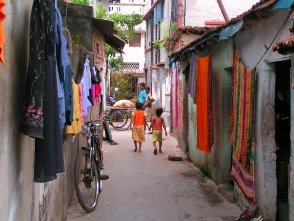I have a memory of a little girl, maybe about 7 years old, begging from us as we walked down a relatively quite Kolkata street. She walked along beside us for a little while. As I thought about her afterwards, I wondered if she knew that there were other boys and girls that didn’t grow up begging, that although it is the norm, it is not normal. It’s not the way the world is supposed to be. And then I realised, of course she knew that, she was looking at their parents.
She knew who to ask for money and who was worth chasing down the street. The white skinned couple. The “bideshis” (foreigners.) So often I question myself – why am I even bothering? Who am I to relocate into a poor neighbourhood with grandiose, idealistic, vague notions of helping? What do I know about community development, poverty relief, articulating my faith in a King who will restore His earth and His people. But as I see myself more as a citizen of His, having global neighbours, I begin to understand that the real question is ‘who am I not to help?’
The buzz words in community development, poverty relief and cross cultural servanthood are things like ‘contextualisation’, ‘empowerment’ with concepts reeling from mistakes made in the past by foreigners coming into a community, emparting their ‘knowledge’ and all-powerful dollar and creating a group of people, who by the end of the process look just like them, quite often with no real long term solution. This of course is a good thing. We must battle against old-school ways of thinking. But when I begin to realise the complexity of what lies ahead of me, I find myself shrinking back. Surely I will make a thousand mistakes. Step on cultural toes. Perhaps leave my neighbours even worse off than when I came? Even as we get so close to heading into India, I am plagued by questions. ‘What is the role of a foreigner in a country like India?’ ‘Shouldn’t development and gospel application be done by those who know it best – Indians?” “What about the extremely poor in my home country?” The conditions of some of the Aboriginal Settlements are often compared to the slums of India. The obvious answer is ‘yes, of course Bengalis need to be attending to their own neighbours .’ Ideally, bideshis wouldn’t be needed at all. However, we live in this age where God has begun a great work to restore His earth and this work is not yet complete. The world is not an ideal place. It is within my physical, emotional and spiritual means to provide immediate relief, at least to that one beggar girl if that is what is truly needed. It is within my means to be used within a longer term solution. I’m not exactly sure what is needed yet. What I do know is that I don’t have a right not to be involved.
Monday Maker - Baby Bubba Steps
8 years ago

No comments:
Post a Comment